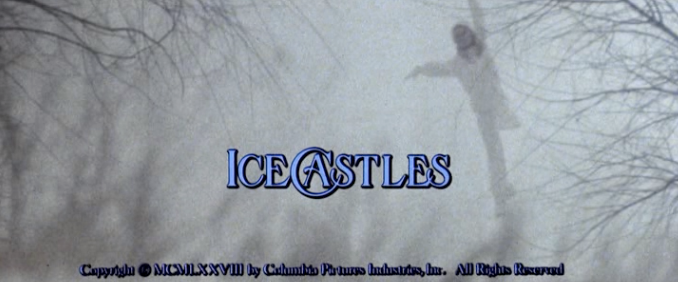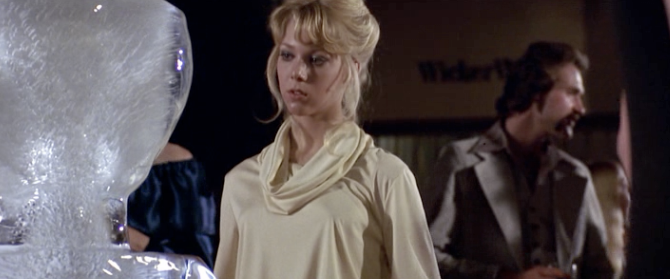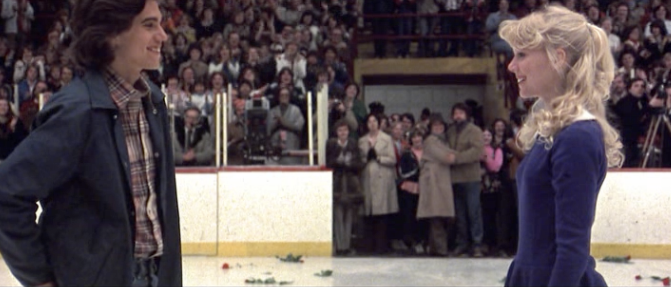Systematic readers of HU will note that Noah has been running periodic weekend surveys in the interest of fostering chatter and garnering recommendations for further reading and viewing. In general, it’s all been a bit highfalutin; almost like an exercise in canon making by the service lift. Noah is basically a serious man despite all avowals to the contrary. Even his community survey on computer games wondered out loud whether they were “art” and misogynistic.
But do you remember when HU promoted low brow endeavors—I suppose superhero comics might be considered in some circles to be the lowest brow of all—and denigrated the canon? If HU really is a smarmy pit of frivolous bad taste, why hasn’t it asked the really tough questions—like which movie endings always make you cry?
For isn’t crying in a darkened room a thoroughly worthwhile experience—a cathartic event on the level of watching an injured bull struck down in the ruedo. Of course, this presumes that the entire experience doesn’t disrupt your manhood or defile your intellect. [I should add here that no comic book has ever made me cry—the form seems to score very low in its ability to manipulate its audience.]
Now I think Noah has admitted to crying together with some art objects like Laura Kinsale’s latest novel and Ian McEwan’s Atonement but the former is like saying you cried at the end of Cinema Paradiso and the latter like admitting you wept at the end of City Lights or Nights of Cabiria. All these examples seem far too beholden to conventional good taste.
But what about crying at the end of Ice Castles?
The last time I watched Ice Castles was in August 2014, which is about 35 years since I first saw it in the late 70s when it was first released. This was also around the time my mother brought me to watch Brian De Palma’s Phantom of the Paradise, an experience which has more or less scarred me for life (I was about 5 or 6 at the time; now released on Blu Ray for those so inclined).
Not having seen what might justifiably be called one of the most beloved movies about figure skating for over a quarter of century meant that I could recollect the one line plot summary but not the particulars. Still, I told my wife that Ice Castles was a Korean-drama made two decades before they made K-dramas. And after watching the thing, she concurred. Dying, suffering, and love suffused heroines are fixtures of Korean and Asian primetime television where the US can only boast of the likes of Outlander (which hasn’t been terribly romantic as far as I can tell). Love and sex are in abundance on American primetime TV but not so much romance; perhaps an accurate reflection of a society now grown cynical of fidelity and affairs of the heart.
Donald Wrye directed the 1978 version of Ice Castles and he is a middling director by reputation. It doesn’t seem to have made much of a difference since Ice Castles is the Casablanca of low brow weepies—a confluence of factors have colluded to make the slightest of material work to the greatest benefit. It is in many ways the perfect “onion.”
The plot is well summarized at its Wikipedia page. In essence, Lexie (played by a young Lynn-Holly Johnson) is a skating prodigy who suffers a tragic accident just as she is about to make it big in the world of skating—she falls and becomes blind due to a brain haemorrhage.
It is only in retrospect that I realized that Wrye had filled the first five minutes of the movie with thinly veiled symbolism. This seems to have been part of the 70s zeitgeist and infected not only De Palma’s reworking of The Phantom of the Opera but also the films of Dario Argento. Yet it seems strange that it should sink its teeth into an unassuming movie about young love. There are a few bars of ominous music played against a blurry white backdrop—a kind of opening which would not look out of place in an Ingmar Bergman movie. Then there’s a slow off focus pan to a winter landscape and a small frozen over lake where Lexie is seen indistinctly skating in mild snow storm. The lake itself is covered in snow a few inches deep and the skater is seen doing her routine in these mildly treacherous conditions.
Some viewers have complained that it takes almost an hour before the key tragedy occurs but the movie is liberal with its premonitions of blindness. It’s the gaping white blurry monster which opens the movie and it’s seen once again just before Lexi falls on an outdoor rink at a post-competition party where she feels out of place. Near the hour mark, there’s a large ice sculpture which Lexie stares at for what seems like half a minute—an eternity in a genre devoted to cut and dried tropes and techniques. The screenplay as a whole positively shuns exposition and embraces conspicuous periods of silence. The sculpture itself is soon transformed into a large white cataract which fills half the screen due to the low depth of field of the cinematographer’s choice of lens.
Lexi has just split up with her boyfriend (played by Robbie Benson) and this physical obstruction to her senses and vision seem almost like a metaphorical representation of her spiritual turmoil. She’s even decked up in thick make-up where the rest of the film only shows her with a more natural complexion (hidden message here folks). When Lexie finally falls and loses her vision a mere 5 minutes later, it is no more than a physical manifestation of her soul. In many ways, Wrye seems to have taken the famous theme song from the movie (used in countless weddings in the 70s and 80s no doubt) to heart; that song being “Through the Eyes of Love (written by Marvin Hamlisch and Carole Bayer Sager and sung memorably by Melissa Manchester). I would not be surprised to hear that Sager had read the screenplay prior to setting down her lyrics.
That the movie is deeply conservative seems self-evident but this too, apparently, was by chance. The trivia section of IMDb suggests that Lynn-Holly Johnson declined to do a nude scene repeatedly over the course of filming. Nor is Lexie the kind of heroine demanded of the modern day marketplace. The movie is about Lexie’s inner core of strength but she is also soft-spoken, traditionally feminine, and inclined to take advice from her father and boyfriend—she is, in a word, dependent on those around her. Her accomplishments are not solely the product of self-reliance but of love and family. She is, in other words, completely normal. Her final scene together with her family and partner is an encapsulation of these seemingly primitive values.
Roger Ebert once accused the makers of Ice Castles of “emotional bankruptcy,” but its motives are much more fundamental; engaging the irrational, and child-like parts of us. Most viewers of Ice Castles understandably focus on the romantic and inspirational aspects of the film, but Sager seemed to grasp its true intent. Her lyrics to the famous theme song are much more ambiguous about the nature of the love being extolled and do not apply exclusively to the amorous parts of our nature. The most passionate kisses seen in the final segment of the film are those of a father for his daughter. In a world grown fat on narcissism, the idea that our accomplishments would be unthinkable without family and friends seems thoroughly implausible. It is this aspect of Donald Wrye’s confection which thoroughly grates on our sardonic adult selves—this faith in those closest to us seems unworthy and false. If we manage to cry with Ice Castles, it is in part because we’ve remembered a part of ourselves long since forsaken.
The movie ends where its begins—Lexie can skate again and she’s together with her boyfriend. Except that she’s blind of course. But was she thus aflicted in the first scene as well, the one where she’s skating in a blinding snow storm?
Wrye also directed the 2010 TV remake of Ice Castles but that strange spark and happy confluence of unexpected decisions seem to have deserted him; the kind of decisions born of seemingly unwarranted dedication and (occasionally) insufficient time and money—the hardness and frugality of the locales and sets, the persistent lingering on faces, the tentative steps carefully built into Lexie’s final routine, the unaffected and uncertain acting of the stars both young and old; their commitment to the barest of material and almost palpable happiness at the movie’s close. It is hard to imagine anything more genuine then Robby Benson’s smile at Lexie at the end of the show.
Gone are the serendipitous (?) snow storms, cheap clothes, cataract inducing ice sculptures, and old fashioned (even for the time) chasteness. The remake is an unneeded gilding of the lily and an object lesson in how even the meanest of entertainments require a certain level of craftsmanship. It’s strange that this pair of undistinguished films should prove so educational in terms of the film editor’s art (the original was edited by Michael Kahn, Melvin Shapiro, and Maury Winetrobe).
Ice Castles isn’t one of the greatest films ever made. It’s not even considered one of the great movie romances by aficionados of the form. I can’t imagine anyone will be watching Lynn-Holly Johnson skate on a frozen pond in 50 year’s time. But Ice Castles did make me cry.
_________
[All screen captures from M.Lady’s Inspirational Sports Movie List.]




I think my Ice Castles would be Tim Burton’s Big Fish.
At some point, I separated my favorite movies into two lists: things I critically regard as fantastic, and things that make me cry. The cry list is like my secret personal canon. Half the time this list scares me too– I’ll strongly disagree with the message of these films, or feel they’re manipulative, but have to concede that they affect me on a level I have little control of.
I feel like comics inability to make people cry has gotten slightly more attention. But has anyone explored it? Is it just an innately non-immersive medium?
“I feel like comics inability to make people cry has gotten slightly more attention”
This is a thing? I never knew this was a thing. I can think, off the top of my head, of a couple of comics that made me cry — Ethel and Ernest, and When the Wind Blows; the death of Raven Sherman (in Terry and the Pirates); and at least two Jaka related bits in Cerebus (which I guess makes me a soul-sucking void or whatevs). But, then again, I cry every time I finish a packet of corn chips, so…
I bet you’d find lots of people who’ve cried at the Locas stories (Love Bunglers, anyone?), or some of Grant Morrison’s stuff (his Doom Patrol epilogue, We3)…
I don’t have any problem crying at comics. I cried a ton at Let Dai; cried at Dokebi Bride; think I cried reading This One Summer, which for the most part I think is eh.
I often laugh at things I don’t necessarily like all that much too…if something can make you laugh or cry, that’s definitely points in its favor, but it doesn’t really have to be too many points.
It’s not just comics for me. I don’t cry when reading normal books as well. Books can send me into this mental whirlwind where I think about them constantly for the next 24-48 hours but the crying thing is close to impossible. Off hand, I would say that music is a pretty constant thing in art objects that make me cry. As is the sight of live humans (probably).
I think crying or being especially moved when encountering romance product is quite important. Lists detailing the best romances usually include movies like The Notebook but it drops way down the list for me because it fails at one of its central aims – and that is to make you cry. And it seems really determined to make you do that which might be part of the problem. I would be more forgiving of shows like Titanic if they touched me in the slightest.
On the other hand, that hint of unrequited love (a romance trope I guess) can lift things slightly for me. Like Edge of Tomorrow seems to work better for me because I see it (partly) as a sadomasochistic love story with Emily Blunt as the dominatrix. No crying though, even if Tom Cruise has tears in his eyes in the final scene. I don’t see it as great SF since I have to mentally tell myself not to think about it too much in order to enjoy it.
People cried at the Doom Patrol epilogue? I can see that happening for the Animal Man epilogue but Doom Patrol…? The Raymond Briggs stuff has no effect on me whatsoever.
Uh-oh, I can see an open thread coming…
Oh, yeah, I think I teared up at both the end of Doom Patrol and the end of Animal Man. Not at We3 though; I really didn’t like that very much.
I’m a little confused that Laura Kinsale is seen as too highbrow; romance novels are pretty thoroughly denigrated. I think Suat may be slightly confused by the fact that he’s probably getting his sense of American romance novels mostly through my essays, which is probably misleading in various ways….
Just because romance novels are denigrated in the U.S. doesn’t mean they should be (btw, they’re thoroughly denigrated where I live as well). Which is why I compare Kinsale to Cinema Paradiso which is somewhat beloved but never seems to make it on to any credible Top 100 movies of all time lists.
I think I’ve told Noah through email that the Asia weekly Top 100 Chinese novels of the 20th century list includes at least two famous romance novelists. Both of whom, my wife tells me, are very mushy. Two of the biggest commercial successes on Chinese primetime TV in the last two years were…romances. I should add that the sad/tragic ending is as much a fixture of Chinese romances as the happy ending is in American romances (apparently). Evan Osnos’ Age of Ambition (a book about China) even includes a formal list of types of “tragic endings” which I didn’t know about till I read about it there. What does this tell you about American and Chinese culture/fandom?
Great piece–I love Ice Castles (although, I don’t think I ever have cried at it, but Robby Benson was one of the first crushes I remember, so there’s that…)
I do think, for myself, music plays a big part in whether I cry at a piece of fiction or not — but not whether it’s seeing “real people,” or not. I mean the DVD menu music for Grave of the Fireflies makes me tear up so much that I wonder why I even bought the damn thing, and I still remember watching Plague Dogs as a very young teen with a friend and near the end both of us turning to each other and instantly wailing. Not as devastating as Fireflies, but a good number of Studio Ghibli films, even the ones I think less of, make me at least tear up. Then again, so did All My Children when I thought it was at its best and I was at my most obsessed, in the ’90s (there’s that music thing, again.)
But I, too, had no idea that the inability to cry while reading comics/manga/whatever was an oft discussed “thing.” Hrmmm…
Peter Sattler, who sometimes comments here, had a semi-infamous presentation at (I believe) ICAF of a paper where he talked about how comics don’t make him cry….
I cried recently over the Laika comic, doesn’t happen very often with films any more. Although the stuff that really haunts me in any media usually doesn’t make me cry.
I teared up at the climax of Frequency despite A. seeing the twist coming from the first act, and B. disliking the movie. Even thinking about it still gets me, and I resent the tearjerking effectiveness of a forgettable film.
Wow, it must be hard crying at a movie you dislike. I’d be too busy getting irritated or falling asleep. But you’ve made me curious about Frequency’s weepy effectiveness.
Yeah, it was really frustrating; like I’d been suckered.
Marge Piercy’s Woman on the Edge of Time just made me cry.